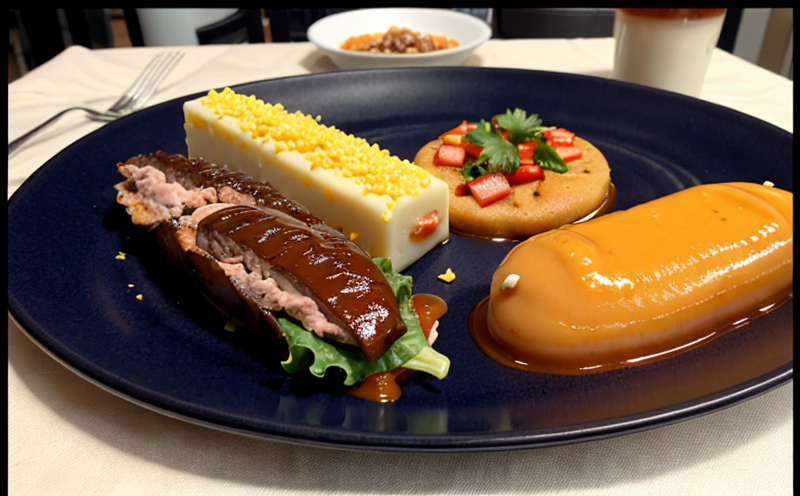EN 1186-8 Testing of Polypropylene in Food Contact
The EN 1186-8 standard is a critical guideline used to ensure that polypropylene (PP) materials, particularly those used in food contact applications, do not leach harmful substances into the food. This testing protocol is essential for maintaining food safety and compliance with regulatory requirements.
Polypropylene is widely used in packaging due to its excellent chemical resistance, strength, toughness, and durability. However, when it comes into direct or indirect contact with foodstuffs, there is a risk that certain additives, stabilizers, or other chemicals may migrate into the food. This migration can pose health risks if not properly controlled.
The EN 1186-8 standard specifies detailed procedures for testing polypropylene used in food packaging to determine whether any potentially hazardous substances are migrating from the material into contact with foodstuffs. The test involves exposing the sample to specific conditions that mimic real-world use scenarios and then analyzing the extractable components.
One of the key aspects of this standard is its focus on ensuring that polypropylene does not release harmful elements such as heavy metals, plasticizers, or other contaminants when used in food contact. The test method outlined in EN 1186-8 provides a standardized approach to evaluating these risks.
The testing process typically involves the following steps:
- Preparing a sample of polypropylene material that will be exposed to conditions designed to simulate real-world use.
- Exposing the sample to a defined food simulant under specified temperature and time conditions.
- Extracting any potentially migrating substances from the sample using an appropriate solvent.
- Analyzing the extracted substances to determine their composition and concentration.
The standard also provides specific acceptance criteria that must be met for the polypropylene to pass the test. These criteria are based on the maximum allowable limits of potential contaminants in the food simulant. Compliance with these limits ensures that the material is safe for use in food packaging.
Understanding the scope and application of EN 1186-8 testing is crucial for quality managers, compliance officers, R&D engineers, and procurement specialists involved in the development and production of polypropylene-based food contact materials. Proper implementation of this standard helps to protect public health by ensuring that all polypropylene used in food packaging meets stringent safety standards.
| Standard | Description |
|---|---|
| EN 1186-8:2009 | European standard for the testing of polypropylene in food contact, focusing on migration and leaching. |
Applied Standards
The EN 1186-8:2009 standard is an essential guide for testing the safety of polypropylene materials used in food contact applications. This European standard provides detailed procedures and acceptance criteria to ensure that no harmful substances are migrating from the polypropylene into the foodstuffs.
EN 1186-8 specifies a series of tests designed to evaluate the migration of substances from the material into the food simulant under defined conditions. These tests include:
Exposure of the sample to various food simulants, such as water, oil, and acid or alkali solutions.
Analysis of the extracted components using appropriate analytical techniques like GC-MS (Gas Chromatography-Mass Spectrometry) or HPLC (High Performance Liquid Chromatography).
The standard also outlines acceptance criteria based on the maximum allowable limits for specific contaminants. Compliance with these limits is crucial to ensure that polypropylene used in food contact materials does not pose a risk to consumer health.
It's important to note that EN 1186-8 testing goes beyond simple chemical analysis; it also considers the potential long-term effects of migration on human health. By adhering to this standard, manufacturers can ensure their products meet stringent safety standards and comply with regulatory requirements.
Eurolab Advantages
EuroLab stands out as a leading provider of EN 1186-8 testing services for polypropylene in food contact applications. With our state-of-the-art facilities and experienced technical staff, we offer unparalleled expertise and reliability in this critical field.
Comprehensive Testing Capabilities: EuroLab provides a full range of testing services to ensure that your polypropylene materials meet the strictest safety standards.
Accurate and Reliable Results: Our advanced laboratory equipment and skilled technicians deliver precise test results, ensuring you have confidence in the quality of your products.
Compliance Support: We help ensure that your products comply with all relevant European standards and regulations, including EN 1186-8.
Expert Technical Guidance: Our team of experts can provide guidance on material selection, design modifications, and process improvements to enhance the safety and performance of your polypropylene-based food contact materials.
EuroLab's commitment to quality and customer satisfaction is reflected in our comprehensive testing services. Whether you are a manufacturer, supplier, or developer of polypropylene for food packaging applications, we can help ensure that your products meet the highest safety standards.
Use Cases and Application Examples
Packaging for dairy products: Ensuring that containers used to store milk do not release harmful substances into the milk itself.
Containers for beverages: Testing polypropylene bottles or jars to ensure they are safe for use with carbonated drinks like soda.
Storage bins and food trays: Evaluating the safety of storage solutions used for various types of food, from fresh produce to processed items.
EuroLab has extensive experience in providing EN 1186-8 testing services across these diverse applications. Our expertise allows us to offer tailored solutions that meet your unique needs and ensure compliance with all relevant standards.
Custom Testing Protocols: For more complex or specific materials, we can develop custom test protocols to address unique challenges.
Consultation Services: We provide consultation services to help you understand the implications of EN 1186-8 testing and how it applies to your specific products.
Our comprehensive approach ensures that you receive the highest quality results, giving you peace of mind regarding the safety and compliance of your polypropylene-based food contact materials.





